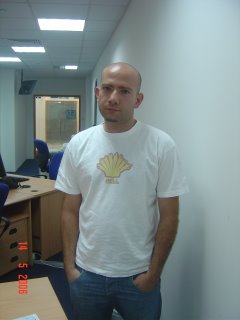Coffee with Leo Burnett Chicago Planner, Tamer Kattan

DC: Tamer you had a stint in Dubai before you moved to LB Chicago…thus a compare and contrast question is due. I asked this to Brenda earlier, how would you describe the current level of planning in the UAE region?
TK: I think the level of strategic planning in any regions advertising industry is directly connected to the number of perspectives and opinions that can be witnessed, shared and discussed by planners (drum
roll) outside of the office. The ability to leave the office, and to look at a question differently not necessarily to find the answer is important.
Example: Oh, you've been the planner on Kelloggs for a year and don't know how to talk about the cereal in a new way? How about speaking to a blind person (better yet - a focus group of blind people) and hearing how they describe the smell, taste, texture, etc etc etc of corn flakes.
Can I leave a predominantly Lebanese agency, Lebanese opinion, Lebanese upbringing, Lebanese perspective at a time when it means so much more to be Lebanese - can I go outside to a restaurant, a cafe, a clothing store and get a British, Philipino, American, Female, Gay, blind, deaf, young, old, married, Japanese, Indian perspective on a problem?
In Dubai the answer is yes, in the rest of the UAE...I don't know.
DC: So where is it headed?
TK: Dubai should be one of the best planning cities in the world. Period.
More impressive than any architectural wonder is the ability of so many different cultures and ways of life to co-exist...happily. If Arab planners stay "Arab", they will not improve. It was Socrates who said:
"I am not an Athenian or a Greek, but a citizen of the world".
If you believe in this statement than you are no longer a Lebanese planner, no longer a planner from Dubai or the UAE, or Chicago, NYC or London.
Regions should not be attached to critical thought (unless you're advertising a regional product of course). I think the greatest thing a planner can do to constantly improve is to exercise non-regional thinking.
DC: Do you feel planners are valued as much as they are in the west?
TK: I think that is 100% up to the individual planner. And if we must focus on a region - I think in many ways you are ahead of the West. If we went back thousands of years, planners, thinkers, philosophers would be alive and well in Rome, Persia, India, Egypt, Greece and the rest of the Middle East...Western society didn't even exist.
DC:What do you believe the planner of the future is?
TK: Be still my heart - we may migrate Client side. The planning process has proven to be critical before we speak to consumers, I believe clients will start to see that the value of the process is just as valuable in directing, creating new products, new offerings and new services.
listening deeply to consumers will affect product/services development much more.
DC: When looking to recruit a young lippy planner, what elements do you search for?
TK: His ability to disagree with me. Have balls. I want someone who offers a different opinion, passion and fun.
DC: First thing you might ask someone in an interview situation?
TK: Its gotten me into trouble, but I ask who they voted for in the elections and why? I ask controversial questions and when I find a topic that we disgree on I ask them to justify their decision...No right or wrong answer, just how well can you support your point?
DC: Name me 3 of your favourite campaigns that have 'planner' written all over 'em.
TK: Thats like saying name me 3 of your favorite illusions that have magician written all over 'em! If I can see the planning, then it wasn't good to me :-). I like the strategy to be invisible.
- The Guardian (UK Newspaper) - Skinhead running at someone, you assume he's a criminal ends up saving the persons life - we give you all the perspectives
- Amul (India) if you don't know them: http://www.amul.com/
- Anna's massage - (Chicago) A guy walks around with a sandwich board attached to his body. He does this crazy, vey fluid, liquid looking dance...looks like he's riding a very loose skateboard and the sandwiche board reads: "Wanna feel this good? - 15th floor Anna's massage and herbal therapy"
DC: A privilege Tamer, good luck in Chicago!














